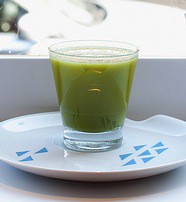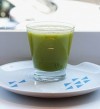Saying No to Juice


Someone should design a comedy routine in which nutritionists are lined up and asked to complete the sentence: Juice cleanses are … The responses I got included “nonsense,” “unsustainable,” “bone-headed,” and “not the answer” — and I think my interlocutors were trying to be polite. We need protein and fat in our diets. We also need to consume enough calories to reassure our bodies we aren’t starving, or we risk all kinds of metabolic and electrical freak-outs. Plus, liquefying fruits and vegetables means getting rid of fiber, which aids digestion by sustaining the microflora in our gut.
“We have cave-people bodies that are built for survival,” says Dr. Elizabeth Applegate, a senior lecturer in the nutrition department at the University of California–Davis. “We do a good job recouping our losses, but that doesn’t make juice cleanses at all healthy.” Nor are they effective at keeping off pounds. “On a cleanse diet, you shed water weight as your body breaks down its glycemic stores, but it comes back once you start eating adequately again.”
At Slate, Katy Waldman takes a hard look at the kool-aid (see also Vanessa Grigoriadis at The Cut, if you haven’t already). If I were to finish that sentence it’d go something like, “Juice cleanses are NO, BECAUSE CAFFEINE.” Still, I’ve heard the raves. Dr. Elizabeth Applegate tells Waldman that that euphoria is essentially a “placebo effect”: “Or ketosis. It’s a survival mechanism. You’re all amped up and alert because you need something to eat.” Do share your #juice tales here, over sandwiches. [Slate]
Photo via kurmanphotos/flickr.